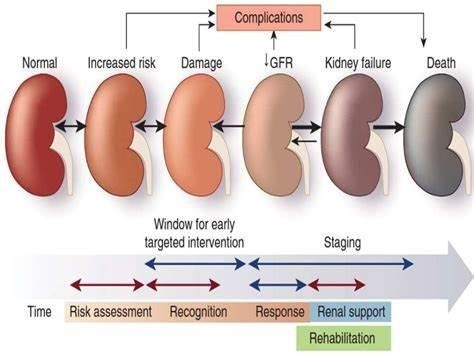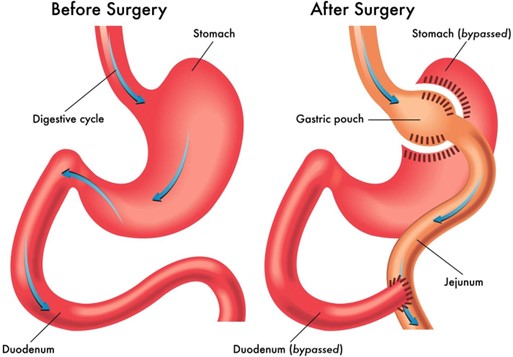Which client requires the most immediate intervention by the nurse?
An older adult receiving enteral feedings via feeding tube who has a temperature of 100.6°F (38.1°C).
A client with acute kidney injury who is somnolent and does not respond to verbal commands.
A young adult who experienced heat stroke and is receiving a normal saline intravenous (IV) fluid bolus.
A pregnant client with hyperemesis gravidarum who is receiving an infusion of Ringer's Lactate.
The Correct Answer is B
A) This client has a mild fever, which may indicate an infection or inflammation. This is a potential complication of enteral feedings, but it is not the most urgent situation. The nurse should monitor the client's vital signs, assess the feeding tube site, and notify the provider if the fever persists or worsens.
B) This client has signs of uremic encephalopathy, which is a life-threatening condition caused by the accumulation of toxins in the brain due to impaired renal function. The nurse should intervene immediately to prevent further
neurological damage and possible coma or death. The nurse should assess the client's level of consciousness, check the blood pressure and urine output, and prepare to administer dialysis or other treatments as ordered by the provider.
C) This client has heat stroke, which is a serious condition that can lead to dehydration, electrolyte imbalance, and organ damage. However, the client is receiving a normal saline IV fluid bolus, which is an appropriate intervention to restore fluid volume and correct sodium levels. The nurse should continue to monitor the client's vital signs, skin
temperature, and urine output, and watch for signs of fluid overload or cerebral edema.
D) This client has hyperemesis gravidarum, which is a severe form of nausea and vomiting during pregnancy that can lead to dehydration, malnutrition, and electrolyte imbalance. However, the client is receiving an infusion of Ringer's Lactate, which is an isotonic solution that can replenish fluid and electrolyte losses. The nurse should continue to monitor the client's vital signs, weight, and intake and output, and administer antiemetics or other medications as ordered by the provider.

Nursing Test Bank
Naxlex Comprehensive Predictor Exams
Related Questions
Correct Answer is A
Explanation
Choice A Reason: This is the correct answer because the client's vital signs indicate that she is hypovolemic and dehydrated due to the leakage of gastric contents from the anastomosis site. The nurse should replace fluids intravenously to prevent shock and electrolyte imbalance.
Choice B Reason: Recording the amount of daily wound drainage is important but not the most important intervention for this client because it does not address the immediate problem of fluid loss and hypovolemia. The nurse should monitor the wound drainage for signs of infection and report any changes to the physician.
Choice C Reason: Assessing skin condition and turgor for breakdown is important but not the most important intervention for this client because it does not address the immediate problem of fluid loss and hypovolemia. The nurse should assess the skin for signs of dehydration and pressure ulcers and provide appropriate skin care.
Choice D Reason: Turning every 2 hours around the clock from side-to-side is important but not the most important intervention for this client because it does not address the immediate problem of fluid loss and hypovolemia. The nurse should turn the client to prevent complications such as pneumonia and atelectasis but also consider the client's comfort and pain level.

Correct Answer is A
Explanation
Choice A Reason: This role is responsible for coordinating the continuum of care for clients with complex health needs, such as head injury. The nurse case manager collaborates with the interdisciplinary team, the client, and the family to plan, implement, and evaluate the client's care from admission to discharge.
Choice B Reason: This role is responsible for providing primary and specialty care to adults, such as diagnosing and treating acute and chronic conditions, prescribing medications, and ordering tests. The adult nurse practitioner may be involved in the client's care, but not in coordinating it.
Choice C Reason: This role is responsible for managing the daily operations of the neurology unit, such as staffing, budgeting, quality improvement, and staff development. The neurology unit supervisor may oversee the client's care while on the unit, but not throughout the continuum of care.
Choice D Reason: This role is responsible for identifying and preventing potential risks and liabilities in the healthcare setting, such as errors, injuries, infections, or lawsuits. The risk management nurse may monitor the client's care for quality and safety issues, but not for coordination.
Whether you are a student looking to ace your exams or a practicing nurse seeking to enhance your expertise , our nursing education contents will empower you with the confidence and competence to make a difference in the lives of patients and become a respected leader in the healthcare field.
Visit Naxlex, invest in your future and unlock endless possibilities with our unparalleled nursing education contents today
Report Wrong Answer on the Current Question
Do you disagree with the answer? If yes, what is your expected answer? Explain.
Kindly be descriptive with the issue you are facing.
